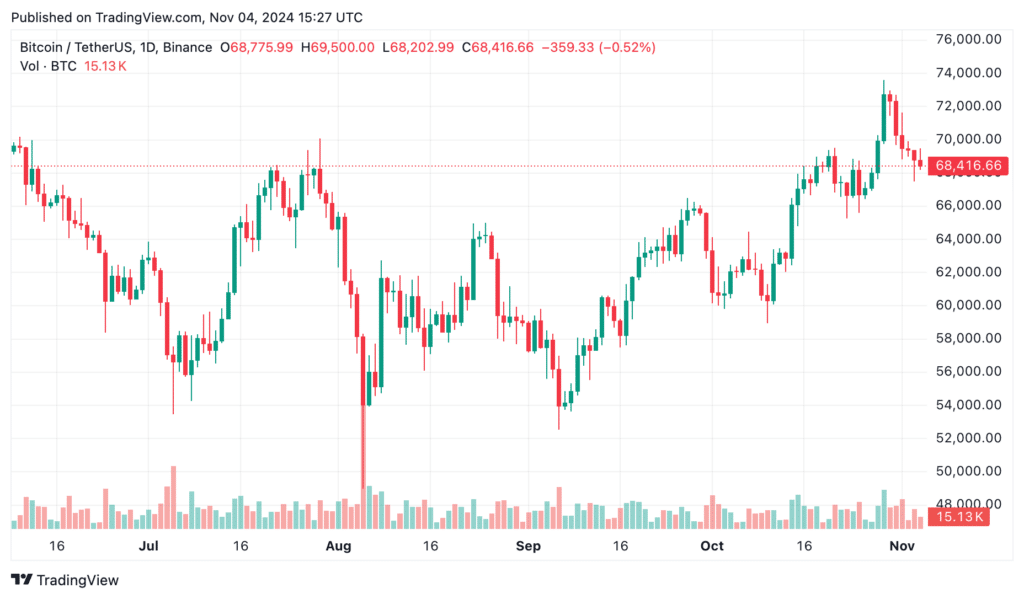As the Fed meeting and elections loom, could Bitcoin finally surge past $70k, or are bearish forces too strong to let BTC rise?
BTC teeters on the edge
With the U.S. presidential elections just hours away, the crypto market is on edge, watching every tick of Bitcoin’s (BTC) price as it inches toward the critical $70k mark.
 BTC 6-month price chart | Source: TradingView
BTC 6-month price chart | Source: TradingViewAs of Nov. 4, BTC is facing new resistance at the $70,000 level. Not long ago — on Oct. 29 — Bitcoin briefly soared to $73-74k, only to see bearish sentiment pull it back.
The stakes are high, not only because of the elections but also due to an upcoming Federal Reserve meeting on Nov. 6-7, where further economic cues are expected.
Interestingly, Republican Donald Trump currently holds a 59% chance of winning as per Polymarket odds, down from a high of 66% on Oct. 30. Bitcoin’s movements appear closely intertwined with these shifting election predictions.
Kamala Harris, the Democratic candidate, has seen her odds rise from 33% to 42% as of Nov. 4, just hours before Americans head to the polls. A Trump win has been touted as bullish for crypto, adding another layer of anticipation.
With BTC waiting for its next big trigger, what could drive Bitcoin up or down next? Let’s break down the key factors, explore potential market catalysts, and dive into what experts are saying about where BTC could be headed in this power-packed week.
Key triggers for Bitcoin’s price ahead
Crypto markets are likely to remain volatile as they await election results, but history suggests a pattern – Bitcoin has rallied after every U.S. election since 2009.
While short-term reactions can vary, past data shows that BTC’s election-day price has never been revisited, with peaks typically occurring within a year.
Given that Bitcoin remains undervalued compared to previous cycles — with only a modest 7% increase since the last halving—some analysts argue that a long-term rally could be in the cards, possibly reaching new highs if the election triggers sustained interest.
Beyond the election, other key data points will shape Bitcoin’s path this week.
On Nov. 7, initial jobless claims data is expected, offering insights into the U.S. labor market. Last week, claims came in at 216,000, a decrease from 228,000 the prior week, but predictions for this week point to a slight rise to 220,000.
Higher jobless claims could indicate a softening labor market, which may dampen consumer spending and traditional investments in stocks and bonds.
This scenario could increase Bitcoin’s appeal as an alternative investment, especially for those seeking to hedge against economic volatility.
The Federal Open Market Committee meeting on Nov. 6-7 adds another layer of anticipation. The Fed’s focus on balancing inflation and employment has kept the market guessing about rate cuts, and expectations are high.
In its last meeting, the Fed cut rates by 50 basis points (0.5%) as inflation eased to 2.4%, inching closer to its 2% target.
Unemployment, however, has risen from 3.7% to 4.1% this year, signaling potential challenges in the labor market.
Economists are speculating that another rate cut is likely, with CME’s FedWatch tool indicating a 99.9% probability of a 25-basis-point cut.
For Bitcoin, a Fed rate cut could be a bullish signal. Lower rates tend to reduce the appeal of traditional savings and investments, driving interest toward risk-assets like BTC.
ETF inflows and liquidations paint a mixed picture
As we edge closer to the U.S. elections, Bitcoin is showing mixed signals. October 2024 wrapped up with BTC posting a modest 10.76% gain — considerably lower than its impressive 28.52% rally in October 2023, hinting that investors are proceeding with caution, likely waiting for more clarity on the election outcome.
In the past 24 hours leading up to Nov. 4, the market witnessed significant liquidations, with a total of $193 million in positions wiped out.
A closer look shows that $101 million in long positions and $91 million in shorts were liquidated, revealing an unusual balance between bullish and bearish bets being forced out of the market.
However, Bitcoin bore the brunt of these liquidations, taking a hit of over $52 million — split between $21.05 million in long liquidations and $30.48 million in shorts, suggesting that despite some optimism, bearish forces are still actively pushing against BTC’s upward momentum.
Adding to this cautious mood, spot Bitcoin ETFs—which saw enthusiastic inflows in most of October — experienced their first outflow on Nov. 1 after a steady inflow streak beginning Oct. 23.
Notably, Oct. 29 and 30 alone saw massive inflows of $827 million and $896 million, respectively, signaling strong initial demand for BTC ETFs.
But the recent outflow may hint at short-term profit-taking as investors await further cues from the elections and Fed meeting.
Is Bitcoin headed for a major move post-election?
As Bitcoin hangs at a critical level, the coming days could be crucial for its next big price shift.
Some traders, like Daan Crypto Trades, believe Bitcoin is primed for a major swing. According to Daan, “There is a good probability that price will see at least a 10% move to either direction depending on who ends up winning the election.”
#Bitcoin Not the cleanest looking weekly candle this week but with what's coming I don't think it really matters either way.
I think there is a good probability that price will see at least a 10% move to either direction depending on who ends op winning the election this week. pic.twitter.com/OMvGCpr3Ba
In the macro landscape, the economy shows signs of strain, with last week’s job data reported as the worst in three years. This softening in the labor market has some, like Michaël van de Poppe, speculating that we might soon see the start of an “up only season,” especially if the Fed decides to implement further rate cuts.
It's the big week!
Elections & the FED.
Last week, the worst job data in 3 years, so I'm assuming that up only season is literally around the corner.#Bitcoin tested the green area for support.
It's hard to tell which way we're moving, expecting some more volatility to come. pic.twitter.com/9pAWzdcZ8F
With Bitcoin recently testing key support, he cautions that “more volatility” is likely, implying further turbulence but potential buying opportunities if prices dip lower.
Meanwhile, Spot On Chain points out that historically, the real bull run for Bitcoin has often begun after elections, regardless of the winning party.
The market is entering its most volatile week with the U.S. election and FOMC meeting, but this rally may be here to stay.
Historically, the real bull run begins post-election, and we believe that whether Trump or Harris becomes the next president, $BTC will continue its upward… pic.twitter.com/7cvCo8QxGK
Their outlook suggests that “whether Trump or Harris becomes the next president, BTC will continue its upward journey,” even reaching the $100,000 mark soon.
In fact, if Republicans win both the presidency and Congress, Standard Chartered analysts are projecting Bitcoin could even reach $125,000 — a scenario that would mark a historic high for the crypto market.
However, it’s crucial to exercise caution amid this optimistic forecast. Despite the bullish predictions, the current market environment remains fragile, with macroeconomic headwinds that could dampen Bitcoin’s upside.
The mixed economic signals, election results, and Fed policy shifts will likely dictate Bitcoin’s path. With potential gains come equal risks, and while the long-term outlook might look promising, the short-term road could be rocky.
As always, caution and clear risk management are essential in a market bracing for drastic shifts. Trade wisely and never invest more than you can afford to lose.
Disclosure: This article does not represent investment advice. The content and materials featured on this page are for educational purposes only.

















 English (US) ·
English (US) ·